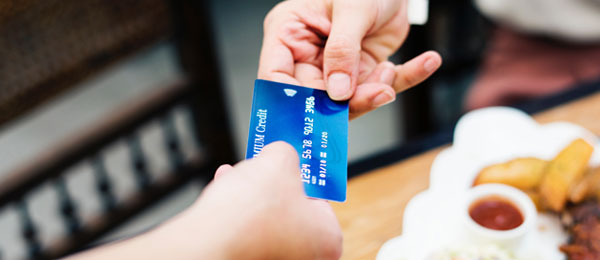How to earn your way to a ‘free Christmas’
By recycling presents, making presents, or selling unwanted items, You CAN have...
Using credit to pay for anything and everything – from holidays to the weekly food shop or new clothes – is pretty much a way of life for many people. Credit in itself isn’t a bad thing. However, constantly relying on credit to pay for living costs isn’t something you can do over the long-term.
Are you worried about how much you rely on your credit card, store card or catalogue? How can you tell that you might need help?
Let’s look at some of the warning signs…

One of the upsides of credit is that it lets you make purchases sooner rather than later. However, there’s a negative aspect to this: you’re essentially putting off paying until another day.
There’s also a false comfort in using products such as a credit card to pay an MOT bill, or a catalogue account to replace clothes or cover Christmas presents for the kids.
You’re being charged interest on these purchases, and this is often quite high. So when Christmas or MOT time rolls around, you have that same large bill to pay but with an extra cost on top.
By the time you’ve entered year two, three or even four, you’ve potentially paid hundreds or even thousands of pounds in interest alone.
By understanding your budget, you’ll have a better idea of how much money you can save each month towards those big one-off expenses.
Saving money can be tough to begin with, but once you’re in the habit of saving you might find yourself having fun with it. Most importantly, you’ll save money over time as you won’t have to factor in added interest and charges.
When you take out a product such as a credit card, store card or catalogue account, minimum monthly payments can seem appealing. “They only want £x per month? I can manage that, no problem…”
In principle, minimum payments are based on good intentions, as they’re meant to give you flexibility if money’s tight now.
However, there’s a catch with paying the minimum on credit cards, catalogue accounts and store cards over a long period. Minimum payments only clear a small amount of your balance, if any at all. The payment is mainly going towards interest and charges on the balance that you owe.
What’s more, if you make 18 minimum payments in a row, and none or very little of the balance is cleared, this is classed as a ‘persistent debt’.
If the minimum payments continue for another 18 months, your creditor may have to increase your minimum monthly payment for you. In some cases, they may take the credit product away altogether.
So here’s the rub – if you’re relying on credit for expenses such as food, clothes and Christmas presents, and you’re unable to pay more than the minimum each month, you’re going to run into problems eventually.
If you’re worried that your balance might fall into persistent debt, our dedicated team can help you explore your options. Please call them on 0300 303 2517 or you can email earlyinterventionteam@stepchange.org.
We’re available Monday to Friday, 9am to 5pm.
Whether it’s car repairs or reduced income due to illness or unemployment, emergencies happen to everyone. In fact, many people get in touch with us due to redundancy or because their living costs rise above their income.
What do you do if something unexpected happens and you don’t have the cash for it? You might have no choice but to put it on your credit card.
However, if you’ve already got a high credit card balance this extra cost may make your situation worse.
If you have an emergency fund to fall back on, you’re less likely to have to rely on credit if something bad happens. Again, getting started with saving money isn’t always easy. Luckily there are some savings challenges that can help you put some money aside regularly (such as the Skint Dad ‘penny savings challenge’, as tried by Charley).
There are also several online banking apps that can round up your spending and put the extra change into a savings pot. Over time, you may find that this rounded up money turns into a decent ‘rainy day’ pot, should you ever need it.

Cast your mind back 10 or 20 years… remember how you couldn’t go to the till of any department store or clothes retailer without the shop assistant trying to sell you a store card? Remember how they’d usually tell you all about the discounts and special offers you’d get for signing up?
They may have even said, “Hey, instead of paying for this shirt/dress/bag with cash, why not put it on the store card today and pay later?”
Depending on how you were doing financially, you may have thought, “Why not? One less payment to worry about for now.” Then, you went to another retailer, and they offered you a store card and the ability to pay for your items later. And so on. And so on.
You may also remember that hardly anyone told you about the high interest rate on these cards. Before you knew it, all of your high store chickens came home to roost at once, and boy those birds are expensive!
If you regularly pay for your clothes and presents on a store card you’re accruing a lot of interest, something you wouldn’t have to pay out if you’d bought the items with cash. Also, if you’re paying the minimum payment on your store card each month, it could eventually become a persistent debt.
In some circumstances, paying off your current debt balance with another credit product can be positive. In fact, if you have a persistent debt, it’s worth considering paying it off with a credit card that has a lower interest rate.
Sadly, some people can get caught in a trap of transferring their balance from one credit card to another, and then another, and so on. This can often become confusing, and it’s easy to lose track of which card you owe money on and which card you should cancel.
Once you’ve paid a balance off, it’s best to cancel the old account as soon as possible. That way, you won’t be tempted to start spending on it again, which often results in a bigger debt problem.
According to author Dr. Gary Chapman, humans express their affection for one another through one of five ‘Love Languages’. They are:
Now, there’s nothing wrong with being an affectionate, generous person. Buying thoughtful gifts for people you care about is lovely, as is the rush of happiness you feel at the act of giving a gift and seeing the joy in the recipient’s face.
Gift giving isn’t a problem if you can truly afford to buy gifts without it impacting your household bills or living costs. However – there’s that word again – you should NEVER put yourself in a stressful financial situation because you’re trying to show how much you care through buying gifts.
You may be a ‘spoiler’ if you tend to:
If you identify with one or more of these there’s a high chance that you may rely on credit at some point to live up to the high expectations you’re putting on yourself.
If you think you may have a problem with excessive shopping, please know that there’s help available. You can speak in confidence to your GP, who’ll be able to put you in touch with confidential support groups.

Arranged overdrafts are meant to be dipped into occasionally to help with emergencies or short-term problems. However, our research has found that millions of people are constantly overdrawn and locked into a cycle of borrowing that’s hard to break free from.
Overdrafts often have high interest rates and getting ‘stuck’ in one can be a warning sign that you might need debt advice, especially if you find yourself using it to pay for basic living costs.
Constantly falling into an unarranged overdraft at the end of the month, where you spend more than what’s in your account or go over your overdraft limit, can also hint at a problem.
Putting together a budget is the first step to taking back control of your overdraft. This will help you plan your spending so you can reduce your reliance on your overdraft.
It’s important to remember that overdrafts are still a debt, even if you’re not charged for having one.
If you think you may have a debt problem – or even a potential debt problem – try our 60-second repayment checker. It’ll ask you a few simple questions, and based on your answers, it can tell you if you’d benefit from free and confidential advice.
Need some help taking action on your finances? Our 7 Days, 7 Ways email programme gives you step-by-step support with your budget and debts, while highlighting ways you can save money and boost your income.
Posted by Rachel in Living with debt
04 Jun 2019
By recycling presents, making presents, or selling unwanted items, You CAN have...
To help anyone on a debt management plan we’ve picked the nine...
Don't get tripped up by a bankruptcy pitfall. This simple guide will...
